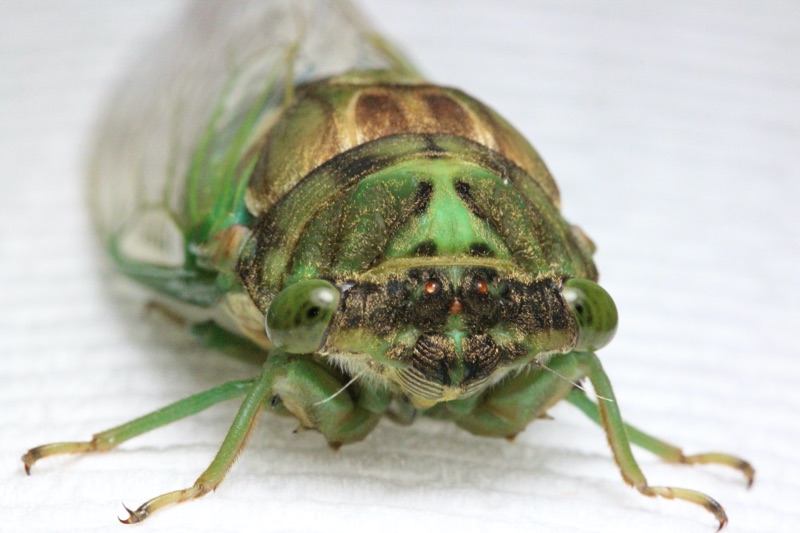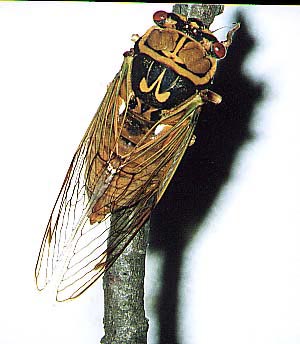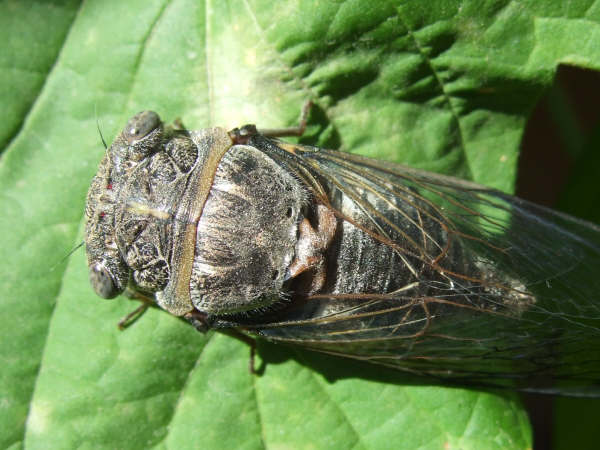Sometimes you wake up and the whole world is different. See this cicada:

photo by me.
… when I went to sleep she was a Tibicen tibicen tibicen, but now I know she is a Neotibicen tibicen tibicen. 10 years ago, she was a Tibicen chloromera. 130 years ago, she was Cicada tibicen. Cicada names change as researchers discover their differences.
Two new papers have split the Tibicen (or Lyristes) genera into many genera: Tibicen (European Tibicen), Auritibicen (Tibicen of Asia/Japan), Neotibicen (mostly eastern North American Tibicen), and Hadoa (Tibicen of the western United States).
The first paper is Description of a new genus, Auritibicen gen. nov., of Cryptotympanini (Hemiptera: Cicadidae) with redescriptions of Auritibicen pekinensis (Haupt, 1924) comb. nov. and Auritibicen slocumi (Chen, 1943) comb. nov. from China and a key to the species of Auritibicen by Young June Lee, 2015, Zootaxa 3980 (2): 241—254. This paper establishes the new genera Auritibicen, and the members of the Tibicen/Lyristes genera fall into that genera. Here is a link. So, Tibicen flammatus aka Lyristes flammatus of Japan, for example, becomes Auritibicen flammatus.

Auritibicen flammatus photo by Osamu Hikino.
The second paper is Molecular phylogenetics, diversification, and systematics of Tibicen Latreille 1825 and allied cicadas of the tribe Cryptotympanini, with three new genera and emphasis on species from the USA and Canada (Hemiptera: Auchenorrhyncha: Cicadidae) by Kathy B. R. Hill, David C. Marshall, Maxwell S. Moulds & Chris Simon. 2015, Zootaxa 3985 (2): 219—251. This paper establishes the Neotibicen (Hill and Moulds), and Hadoa (Moulds) genera. This paper also sought to establish the Subsolanus genera for the Asian Tibicen/Lyristes species but the previously mentioned paper by Young June Lee has precedence because it was published first. Link to paper.
To recap, European Tibicen/Lyristes are Tibicen…

Tibicen plebejus photo by Iván Jesus Torresano García.
… Asian Tibicen/Lyristes are now Auritibicen. Mostly-eastern North American Tibicen are now Neotibicen, and Western North American Tibicen are now Hadoa. Note that, the catagorization is not due to location, but to genetic and physiological evaluation (read the papers).
Needless to say this website and others have a lot of name changing to do, but in the mean time, here’s where the North American species fall out:
| Neotibicen | |
|---|---|
| Tibicen auletes | Neotibicen auletes |
| Tibicen auriferus | Neotibicen auriferus |
| Tibicen canicularis | Neotibicen canicularis |
| Tibicen cultriformis | Neotibicen cultriformis |
| Tibicen davisi davisi | Neotibicen davisi davisi |
| Tibicen davisi harnedi | Neotibicen davisi harnedi |
| Tibicen dealbatus | Neotibicen dealbatus |
| Tibicen dorsatus | Neotibicen dorsatus |
| Tibicen figuratus | Neotibicen figuratus |
| Tibicen latifasciatus | Neotibicen latifasciatus |
| Tibicen linnei | Neotibicen linnei |
| Tibicen lyricen engelhardti | Neotibicen lyricen engelhardti |
| Tibicen lyricen lyricen | Neotibicen lyricen lyricen |
| Tibicen lyricen virescens | Neotibicen lyricen virescens |
| Tibicen pronotalis pronotalis | Neotibicen pronotalis pronotalis |
| Tibicen pronotalis walkeri | Neotibicen pronotalis walkeri |
| Tibicen pruinosus fulvus | Neotibicen pruinosus fulvus |
| Tibicen pruinosus pruinosus | Neotibicen pruinosus pruinosus |
| Tibicen resh | Neotibicen resh |
| Tibicen resonans | Neotibicen resonans |
| Tibicen robinsonianus | Neotibicen robinsonianus |
| Tibicen similaris | Neotibicen similaris |
| Tibicen superbus | Neotibicen superbus |
| Tibicen tibicen australis | Neotibicen tibicen australis |
| Tibicen tibicen tibicen | Neotibicen tibicen tibicen |
| Tibicen tremulus | Neotibicen tremulus |
| Tibicen winnemanna | Neotibicen winnemanna |
| Hadoa | |
| Tibicen bifidus | Hadoa bifida |
| Tibicen chiricahua | Hadoa chiricahua |
| Tibicen duryi | Hadoa duryi |
| Tibicen inauditus | Hadoa inaudita |
| Tibicen longioperculus | Hadoa longiopercula |
| Tibicen neomexicensis | Hadoa neomexicensis |
| Tibicen parallelus | Hadoa parallela |
| Tibicen simplex | Hadoa simplex |
| Tibicen texanus | Hadoa texana |
| Tibicen townsendii | Hadoa townsendii |
6 replies on “Major Changes to the Tibicen genera”
Ah Gents, the march of progress means that we have to constantly relabel our specimens- It also dates our reference books with all those wonderful photos!! Don’t worry, as Kees mentions, the Australia Cicadetta genus is now a whole range of new genera (Moulds 2012). You should see how virus nomenclature has changed over the decades.
Dan, this is a great synopsis of the new information from Kathy et al and Young June. Thanks for the prompt. Dave- great paper1
David.
while this may seem initially frustrating to some, it’s actually makes things simpler once you are used to it.
This is not an isolated incident, just see what happened to Cicadetta here in Australia.
Now we can store and show our cicadas that are true to their genus/family etc.
As we understand what makes a species a species we learn more about the differences between species. While someone like me struggles to understand some of the science behind it, I love it just the same
Changes like this are indeed disruptive, but in this case the reassignments are overdue. The only way to allow all of the current Tibicen species to retain the name, and still conform to current standards in taxonomy, would be to move all of the species of Cryptotympana, Raiateana, Cacama, Cornuplura, and probably other genera into Tibicen, which would create one very unwieldy genus (and disrupt the other names).
This situation illustrates the advantage of a well-established set of common names, which do not need to change very often.
Apparently it’s possible to admire and respect the people who did this and shake one’s fist skyward because of the amount of editing one will have to do as a result, because that’s what I’m doing.
This will make understanding the scientific names of all these cicadas so much more confusing. This is a huge change.
Read the PDF linked to the article — it is quite amazing.